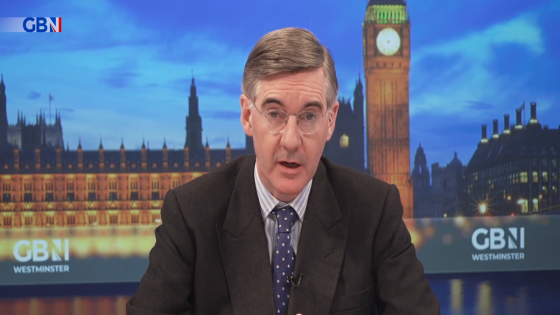The government’s independent review of social cohesion has been released.
It’s written by Dame Sara Khan, who had a piece in today’s Telegraph, which opened as follows with a tinted spectacle view of our history: “Britain’s strength lies in its richly diverse and cohesive democracy, built on centuries hard won rights. Our commitment to individual liberty, equality and democratic freedoms form the bedrock of our nation”.
Unfortunately, this is fatuous nonsense. Until recently, our democracy was not diverse, and it’s never been cohesive.
Democracy requires a variety of strongly held views, and our constitution has been vigorously challenged.
Jacob Rees-Mogg reacts to a new report on social cohesion
GB News
The strength of our constitution lies in its adaptability, and it survived serious challenges over centuries.
Just going back to the 17th century and not earlier, there was a civil war, a restoration, and a glorious revolution in 1642, 1660 and 1689, respectively.
In the relatively peaceful 18th century, there were rebellions in 1715, 1745 and the French Revolution in 1789 was thought likely to topple the whole British system, and some traitors like Charles James Fox were in favour of doing so.
In the apparently calm 19th century, there was the Cato Street conspiracy to murder the whole of the cabinet in 1820, while there were eight assassination attempts on Queen Victoria, this was in a peaceful time. There was the Chartist March in 1848, when a petition was signed by 2 million people demanding a complete change in our constitution. 80,000 special constables were put on the streets, the Queen was removed to the Isle of Wight, and it all passed off peacefully.
In 1926, there was a general strike that looked to topple the government, and Arthur Scargill in 1984, 1985 led a miners strike trying to do the same. And this is without mentioning the IRA.
So this idea that we’ve been cohesive and charming all the way through is the milksop view of the constitution. And this report also produces some potty statistics that are meant to worry us into abandoning some of our freedoms.
It proposes that 13 per cent of a subgroup polled had to move house because of freedom restricting harassment, FRH, which makes it sound wonderfully technical. This means 2.25 million people have moved house because they’re frightened of their own opinions.
If this were true, it would represent about a quarter of all annual house moves in the UK, which just seems self-evidently improbable. What is closer to the truth is that there are some cases when freedom of speech borders on intimidation, and this should not be, and indeed is not, lawful, and the police should protect people and the opinions they wish to express.
It should not be used as a major clampdown on freedom of speech and stopping protest near schools. We have seen what happens when people try to stop peaceful prayer outside abortion clinics. It leads to an extraordinary overreaction by the police and invents thought crimes.
The other recommendation to reinforce the Equality Act public sector equality duty, to, quote, foster good relations between persons who share a relevant protected characteristic and persons who do not share it, moves in precisely the wrong direction. The Equality Act is a menace that seeks to segregate communities and divide them away from each other. It would be better to repeal it altogether. It also suggests establishing a fund for the impartial office for Social Cohesion and Democratic Resilience, and we do not need another quango or another fund, particularly not an Orwellian one of this kind.
These recommendations miss the point. Britain does have a serious social cohesion problem, specifically with respect to the threat of Islamism and its desire to turn Britain into theocratic state. But the way to combat the threat is not to abandon our democratic traditions of free and vigorous expression, without every move governed by more meddling quangocrats.
We resist tyranny by holding true to our values, demonstrating to our enemies that their attempts at intimidation will not succeed, and understanding our history rather than making it up in this vacuous way.
Source Agencies


